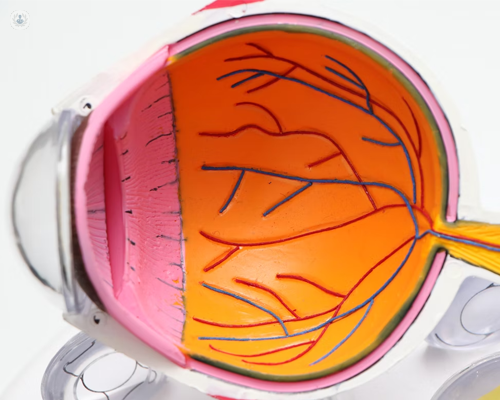A thorough guide to ICL implants
Written by:Commonly referred to as ‘the permanent contact lens’, implantable Collamer lenses are a safe and highly effective treatment to improve eyesight. Mr Alexander Ionides, a highly-revered consultant ophthalmologist who practises in London, shares his expertise on ICL. Mr Ionides explains who is a good candidate for ICL, what the procedure entails, and what to expect post-procedure.

Who is a good candidate for an ICL? Which eye conditions can an ICL treat?
ICL stands for implantable Collamer lens. Collamer describes the thin flexible material the lens is made from. It is rolled up and implanted into the eye behind the iris but in front of the lens and so is sometimes nicknamed the implantable contact lens.
It is typically used for people who are too short-sighted to be suitable for laser refractive surgery, usually above -8.00 but many other people are also eligible for ICL implantation. Those whose corneas are structurally not suitable for laser surgery may be suitable for ICL implantation. The main requirement is to have an 'anterior chamber' deeper than 2.8mm to allow sufficient room for the lens to be implanted. Some long-sighted (hyperopic) people may also be suitable.
How is ICL surgery performed and is it painful?
ICL implantation should not be painful. It is a procedure that is performed in a formal operating theatre as the conditions need to be scrupulously sterile so to avoid any infection getting into the eye at the time of surgery. Such an infection is very rare but disastrous.
It is usually performed under a local anaesthetic. This means people are awake at the time of the surgery but it is not unusual to have some sedation so that people are unaware of the procedure. For the sedation, if used, an anaesthetist is present which means the process is more usually undertaken in a proper hospital setting rather than a clinic.
An incision is made in the cornea which is too small to require stitches and the ICL implanted is rolled up and unravels inside the eye to open like a flower(!) and be accurately placed in the correct position and orientation. It can correct astigmatism as well.
What are the risks of ICL surgery?
The risks are small. The risk of infection is less than 1 in 10,000. The risk of a Toric ICL needing to be repositioned are about 2%. The risk of raised intraocular pressure is mainly caused by retained visco-elastic at the time of surgery is less than 1%. The risk of cataracts is 1%.
What precautions should be taken after ICL surgery?
Long-term follow-up is not recommended by many ICL surgeons. That being said, it is safer to have an annual follow-up for the first few years and then every other year.
How long does it take for vision to stabilise after ICL surgery?
In most cases the following day the vision is very good. Glare and halos and night-time vision can, in some cases, take up to 3-6 months to settle but this is not a big problem. The vast majority of people are happy with their vision from the first week.
Do ICLs need maintenance?
No. However, long-term follow-up is recommended to monitor the corneal endothelial cell count, measure intraocular pressure, and check for cataracts.
When would an ICL need to be removed?
If a cataract develops, an ICL would need to be removed.
If you are interested in finding out more about ICLs and would like to book a consultation with Mr Alexander Ionides, you can do so directly via his Top Doctors profile.


